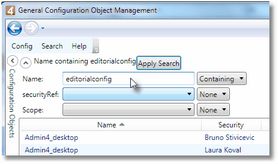Configuring page book variables
There are number of variables to be configured before you can use page books. Use EdAdmin4 to add variables to the EditorialConfig.
1.Run EdAdmin4 and then under Application Configuration, click Client Applications.
2.Expand the search criteria and then in Name enter editorialconfig. Press Enter or click Apply Search.
3.In Results, locate the line with editorialconfig (there should be only one with that name) and then double-click to open it in the right pane.
4.Scroll down to the bottom, and locate the closing tag for the </Dict> node. Between </Dict> and the opening tag <Dict> (up above), there are all global overridable variables, all in the same one-line format, starting by <Item, having a Name and Value.

5.Add variables you need from the below list. Note: there's no error checking, except for the syntax. You're the only responsible to enter the exact variable names (identical to the ones, defined under EdConfig class in Ted.vb), and values that make sense.
6.Save changes (File > Save or CTRL+S) and then restart your Fred4.
List of page copy variables
There are two series of page copy variables:
•glbBxxx... where "B" stands for book
•glbExxx... where "E" stands for edition.
The above allows to provide different handling for copying pages from book to an edition (B-variables) and from one edition to another (E-variables).
| glbBNameDelimiter | Delimiter for the name of page book articles. See Planning a page book naming conventions. Default value is underscore, and it is used if glbBNameDelimiter does not exist in the list. Use onlu characters you don't expect in edition date, and names of zones, or sections. Some characters may be forbidden, such as & etc. |
| glbBDefCopyFolder | Default folder where the page book articles are copied if a target page is not assigned to any section, or the section has not folder associated. |
| glbBPrefix | Default prefix for the name of copied articles. Have in mind that it adds the specified prefix to the full name of the book articles, so it's not the most suitable. See |
| glbBSuffix | Default suffix for the name of copied articles. If you specify it as _%T, the timer number is added to all the names, providing name uniqueness even if you repeat the same operation hundreds of time, or if all your colleagues use at the same time the same page of the book in the same article folder. |
| glbBIfStartsWith | Conditional matcher for the name start. Of course, it works only on fixed names. But, if you specify it as %BP (stands for Book Prefix), it will pick the name of the first book article before the delimiter (either default underscore or the one you've specified in glbBNameDelimiter), and consider it as the default article name prefix. It is replaced with the value of the glbBReplaceStartsWith variable. It is expected that all articles have the same name prefix - if not so, the replacement will not function well. IMPORTANT: %BP is just a marker - you are not supposed to use it in the names of your book articles. |
| glbBReplaceStartsWith | Replace the name, matched by the glbBIfStartsWith with the value specified here. An example could be the string %E(1,4)/_/%S(1,2)/_P/%P(1,2), where % is a prefix that warns Fred4 that the following character is a variable name, related to the target page. The variables could be, at a moment, E-edition date/deadline time; S-section name; Z-zone name; P-page number. As it's unlikely you may ever to want to use the full names, each variable is followed by (x,y), where x is starting character index, typicaly 1, and y is number of characters to take, so %E(1,4) means take first 4 characters of the date. The / is simply a delimiter between variables (not copied in the final name), and the _ is optional delimiter (for a better readability). The case of %P variable (page number) is somewhat special: when you say %P(1,2) it means pad the page number with 0 to the total length of 2, e.g. 01, 02 and so on. Important: if you have more than 99 pages, use %P(1,3) to obtain 001, 002 and so on. |
| glbBIfEndsWith | Conditional matcher for the name end. |
| glbBReplaceEndsWith | Replace the name matched by the glbIfEndsWith |
| glbBIfContains | Conditional matcher for the "contained in" the name. |
| glbBReplaceContains | Replace the name matched by the glbBIfContains |
Then, there are exactly the same variables as above but named glbE... instead glbB, that handle the page copy between editions and not between a template and edition (except glbBNameDelimiter, that is not duplicated - it is assumed that you want edition articles copies to finish in the same folder as book copies).
This provides for a separate handling for edition-to-edition copy.
Normally, in that case you may be satisfied by simply adding "Copy of" prefix.
Thus, the example below, that defines only few necessary variables (copy folder, start/replace pair and prefix for edition-to-edition copy), can be used also in real-life situations
Examples
<Item Name="glbBDefCopyFolder" Value="/JRC/1-Assignments" />
<Item Name="glbBReplaceStartsWith" Value="%E(1,4)/_/%S(1,2)/_P/%P(1,2)" />
<Item Name="glbBIfStartsWith" Value="BP" />
<Item Name="glbEPrefix" Value="Copy of" />

